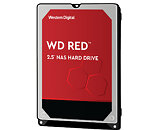- Joined
- Oct 9, 2007
- Messages
- 47,297 (7.53/day)
- Location
- Hyderabad, India
| System Name | RBMK-1000 |
|---|---|
| Processor | AMD Ryzen 7 5700G |
| Motherboard | ASUS ROG Strix B450-E Gaming |
| Cooling | DeepCool Gammax L240 V2 |
| Memory | 2x 8GB G.Skill Sniper X |
| Video Card(s) | Palit GeForce RTX 2080 SUPER GameRock |
| Storage | Western Digital Black NVMe 512GB |
| Display(s) | BenQ 1440p 60 Hz 27-inch |
| Case | Corsair Carbide 100R |
| Audio Device(s) | ASUS SupremeFX S1220A |
| Power Supply | Cooler Master MWE Gold 650W |
| Mouse | ASUS ROG Strix Impact |
| Keyboard | Gamdias Hermes E2 |
| Software | Windows 11 Pro |
Western Digital launched the WD Red line of hard drives and solid state drives specifically for NAS applications. The rigors of NAS involves not just near 24x7 uptime, but also the ability to work in RAID volumes, as most NAS servers ease the process for end users to set up RAID volumes for data redundancy. Data Storage-focused tech publication Blocks & Files alleges that some WD Red HDDs are shipping with shingled magnetic recording (SMR), a physical-layer data recording technique that makes the drive unfit for RAID, and in turn unfit for most serious NAS setups.
SMR is a recording technique that aims to achieve higher data density per platter, by partially overlapping tracks, by taking advantage of write tracks being wider than read tracks. Think of it as trying to cram a little more than one line of text per ruling, in a ruled notepad. The biggest trade-off with cramming in more data using SMR is a heavy loss in random write performance. The controversy of Western Digital shipping SMR WD Red drives came to light when Alan Brown, a network administrator with the UCL Mullard Space Science Laboratory, noticed that a brand new WD Red HDD kept getting kicked out of RAID arrays during resilvering (rebalancing of data with the addition of a new disk to an existing RAID array).

An elaborate investigation and discussion in a Smartmontools thread reveals that both Western Digital and Seagate appear to be shipping HDDs with "DM-SMR" (drive-managed SMR), a feature where the HDD's controller internally performs SMR to increase data density when the physical media is running out of space under CMR (conventional magnetic recording, with conventionally spaced tracks). Think of this as a crude analogue to pseudo-SLC caching employed by modern SSDs. Making matters worse is that DM-SMR drives don't report SMR to host controllers. "Beware of SMR drives in CMR clothing," the thread's title reads. A thread in the user forums of Synology, a prominent NAS manufacturer, recounts a similar horror story.
In our opinion, there's no mitigation for this issue, other than returning your WD Red drives for a refund from your reseller. Western Digital markets WD Red as being optimized for NAS applications. Playing well in RAID volumes forms a big part of that "NAS-readiness." It should be the manufacturer's responsibility to inform customers that the drive uses SMR in some shape or form. DM-SMR counts as one.
View at TechPowerUp Main Site
SMR is a recording technique that aims to achieve higher data density per platter, by partially overlapping tracks, by taking advantage of write tracks being wider than read tracks. Think of it as trying to cram a little more than one line of text per ruling, in a ruled notepad. The biggest trade-off with cramming in more data using SMR is a heavy loss in random write performance. The controversy of Western Digital shipping SMR WD Red drives came to light when Alan Brown, a network administrator with the UCL Mullard Space Science Laboratory, noticed that a brand new WD Red HDD kept getting kicked out of RAID arrays during resilvering (rebalancing of data with the addition of a new disk to an existing RAID array).

An elaborate investigation and discussion in a Smartmontools thread reveals that both Western Digital and Seagate appear to be shipping HDDs with "DM-SMR" (drive-managed SMR), a feature where the HDD's controller internally performs SMR to increase data density when the physical media is running out of space under CMR (conventional magnetic recording, with conventionally spaced tracks). Think of this as a crude analogue to pseudo-SLC caching employed by modern SSDs. Making matters worse is that DM-SMR drives don't report SMR to host controllers. "Beware of SMR drives in CMR clothing," the thread's title reads. A thread in the user forums of Synology, a prominent NAS manufacturer, recounts a similar horror story.
In our opinion, there's no mitigation for this issue, other than returning your WD Red drives for a refund from your reseller. Western Digital markets WD Red as being optimized for NAS applications. Playing well in RAID volumes forms a big part of that "NAS-readiness." It should be the manufacturer's responsibility to inform customers that the drive uses SMR in some shape or form. DM-SMR counts as one.
View at TechPowerUp Main Site






 ). The goal is high capacity with decent sequential write.
). The goal is high capacity with decent sequential write.



